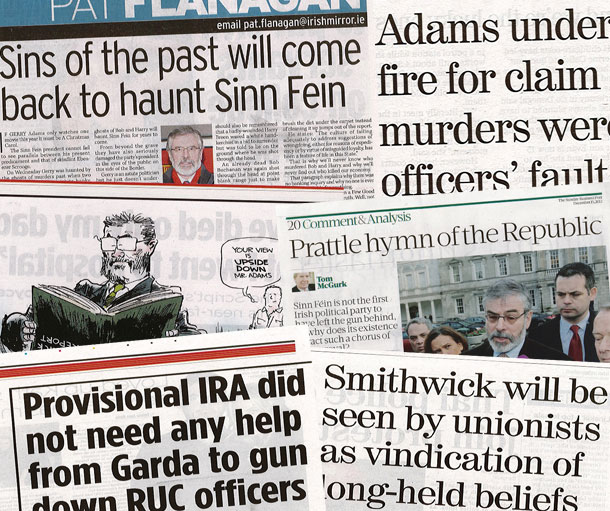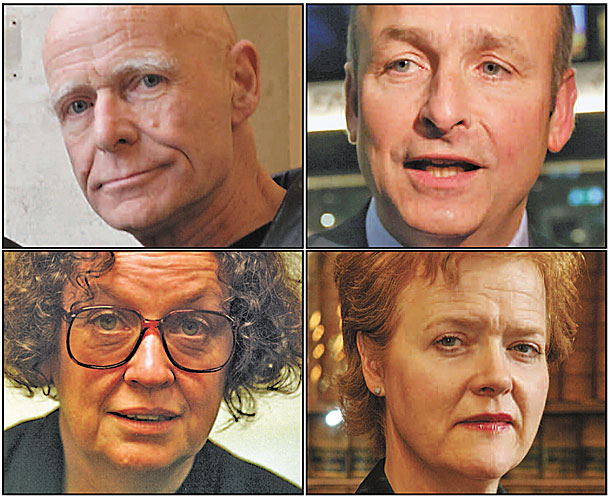12 January 2014 Edition
Carnival of reaction
Hysterical attacks on Sinn Féin show Establishment’s fear

THE increasingly hysterical attacks on Sinn Féin and on party president Gerry Adams are a tribute to the strength of the challenge that Sinn Féin is posing to the Establishment, especially in the South.
Politicians and journalists, from the Right and from the pseudo-Left, have combined to exclude Sinn Féin from the current political debate, using arguments about past strategy as a means of diverting attention from the alternative anti-austerity road that Sinn Féin is mapping out.
Of course, Sinn Féin is not above criticism. Policies can be given a sharper edge (particularly in relation to the Irish-language issues, North and South) but the clear thrust of Sinn Féin policy is a threat to the propertied and privileged, and they are fighting back with venom.
But this campaign is not purely inspired by a careerist politician’s fear of a rival doing better. Certainly, Fianna Fáil are afraid of Sinn Féin winning the support that previously went to that party as a younger generation see through the lies and distortions that misled their parents.
And Labour is quaking with fear that the day of retribution is coming for their brazen betrayal of the interests of working people in whose name the party – occasionally – claims to operate.
Deeper down, there is a growing antipathy on the south Dublin dinner circuit to the idea of a truly independent state. The failure of the 26-County state to realise the aspirations of our people for good, secure employment and the ability to live in our own country have led the middle classes in particular to seek rescue elsewhere.
The fight for separation from Britain has been replaced by an acceptance of integration into Europe, forgetting Connolly’s admonition that “We fight for neither King nor Kaiser but Ireland.”
Less Britain and more Europe has been the limit of the choices the propertied classes have envisaged, with Garret FitzGerald going so far as to claim that the justification for 1916 was that it gave us our own seat in the European Union.
Of course it is better to have our own seat there rather than have Britain speak for us, but better again to have representatives who would speak out assertively for the rights of our people, something sadly lacking during the whole euro crisis and austerity debacle.
Equally, the Southern Establishment has abandoned the idea of reunification. The current government has shamefully ignored the Peace Process and has put no energy whatsoever into the all-Ireland institutions won in the Good Friday Agreement.

• (Clockwise from top left) Eamonn McCann, Mícheál Martin, Ursula Halligan and Ruth Dudley Edwards
And in tune with that, it has done nothing whatever to advance Irish language rights in the North, despite the commitments made at St Andrews. No surprise here, of course, in the light of the indifference and hostility which led Language Commissioner Seán Ó Cuirreáin to resign.
Nor are Fianna Fáil any better. Their only contribution to the Peace Process is to attack Sinn Féin and try to breathe some life into the dead duck that is the SDLP.
Again we have seen the truth of Connolly’s prediction that partition would lead to a carnival of reaction throughout Ireland, with reaction triumphant North and South.
That is why, contrary to the posturing of the ultra-Left, that the fight for reunification in an independent republic which puts equality and the common interests of all of our people in the first place is so important.
Commentators like Eamonn McCann (who purport to distance themselves from what he calls “communal politics”) ignore the reality that the Northern Executive can only bring in a progressive economic policy if it has the power to do so – if Britain cedes that power to the people of the North.
Sinn Féin are alone in fighting for that, with McCann and his ilk standing loftily aside and joining in the media campaign against Adams.
We are back to Connolly’s fundamental point that, as he said in Labour in Irish History in 1910, the working class are the only incorruptible inheritors of the fight for freedom in Ireland.
They are not the only inheritors of that struggle but the determination of the propertied classes in putting their personal interests above those of the rest of us (as shown by the imposition of austerity) show the key necessity of winning the labour movement back to a leading role in the national struggle, as Connolly envisaged.
This means winning the trade union movement away from a slavish following of the now discredited Labour Party and building a new alliance of progressive forces for real change rather than a realignment of perks and privileges.




